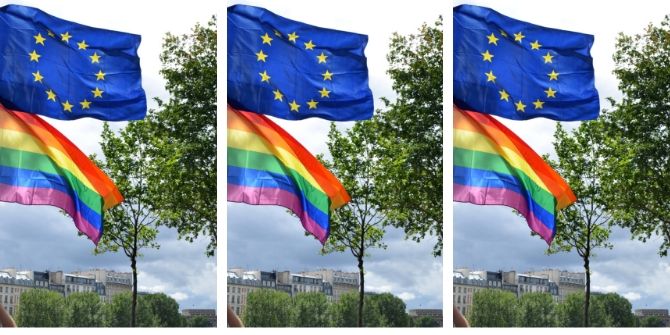In Coming In: Sexual Politics and EU Accession in Serbia, Koen Slootmaeckers considers the promotion of and resistance to LGBTQ equality norms in Serbia’s EU integration process. Elucidating the complexity of the Serbian context, this book is a fascinating account of how enforced Europeanisation can result in countries performing the adoption of LGBTQ rights at an international level while rejecting them domestically, writes Laura Luciani.
Coming In. Sexual Politics and EU Accession in Serbia. Koen Slootmaeckers. Manchester University Press. 2023.

In July last year, the European Commission submitted a legal case against Hungary’s “anti-LGBTQI+ law” before the European Court of Justice, claiming that the discriminatory bill “goes against all the fundamental values of the European Union.” Fifteen EU member states have now joined the “largest human rights case in EU legal history”, which may potentially enshrine LGBT rights as part of the EU’s fundamental values. In this context, Koen Slootmaeckers’ book Coming In. Sexual Politics and EU Accession in Serbia is a timely reminder of the contested nature of “European values” and of the ambiguous political and social outcomes that the symbolism of LGBT rights produces within the EU enlargement process.
A timely reminder of the contested nature of “European values.”
Instead of taking the EU’s LGBT-friendliness for granted, the book claims that EU norms “are constructed and reproduced through its relationship with candidate countries” (12). The analysis focuses on the case of Serbia (2001-15) – seemingly, a frontrunner of EU enlargement, whose relationship with the EU is nevertheless complicated by the unresolved Kosovo issue (and which, the book suggests, is impossible to disentangle from domestic LGBT developments). Based on over ten years of research, an extensive number of interviews, document analysis and participatory observations conducted at Pride events in Serbia, the book provides a fascinating account of how the promotion of, and resistance to, LGBT rights is shaped by the multi-scalar combination of international and domestic politics.
The book provides a fascinating account of how the promotion of, and resistance to, LGBT rights is shaped by the multi-scalar combination of international and domestic politics.
The first, theoretical part of the book takes issue with the state of the literature on Europeanisation, mostly characterised by a top-down approach and a focus on policy outcomes. Rather than discarding it altogether, Slootmaeckers proposes to reconceptualise Europeanisation in relational and dynamic terms: it is “a political process of negotiated transitions” (29), where the content and meaning of the transformations the EU demands as part of the enlargement process are continuously (re)defined, without fixed endpoints. Drawing on queer and feminist scholarship, the book situates the Europeanisation of LGBT rights within the international context of homonationalism (a trend by which a nation’s “gay-friendly” status operates as a standard of “civilisation”) and takes seriously the identity formation and East-West othering processes embedded in EU enlargement. Against this backdrop, Slootmaeckers introduces the concept of “tactical Europeanisation” to capture and reconcile the apparently contradictory processes whereby LGBT rights reforms are performed by candidate countries “at the international level to demonstrate Europeanness, while domestically being decoupled from those values” (15).
This theoretical claim is further unpacked in the second part of the book, where Slootmaeckers meticulously reconstructs the processes of legal and policy change in Serbia. This longitudinal analysis reveals how a ‘”multilayered normative struggle” (50) in EU-Serbia relations has affected the adoption of anti-discrimination policies and the history of the Belgrade Pride. It explains how the tensions between Serbia’s nationalist politics and commitment to Europeanisation are resolved through a utilitarian approach to LGBT rights – with advances being showcased internationally, but domestically left unheeded or actively undermined. Slootmaeckers convincingly demonstrates that tactical Europeanisation is enabled by the very practices that the EU uses to monitor “progress” in the realm of LGBT rights, as well as by the EU’s own “favouring of geopolitical identities over normative ones” (128) when faced with simultaneous resistance across policy fields (namely, the Serbia-Kosovo dialogue and fundamental rights).
Slootmaeckers convincingly demonstrates that tactical Europeanisation is enabled by the very practices that the EU uses to monitor “progress” in the realm of LGBT rights.
The question of progress – how it can be grasped and who it is for – becomes central in the book’s last and arguably most compelling section, which addresses the disjuncture between EU-sponsored, institutionalised recognitions of LGBT rights and lived experiences of everyday oppression. Slootmaeckers shows that anti-discrimination laws remain a dead letter if LGBT people do not seek justice for fear of the forcible coming out, and further social exclusion, that results from reporting discrimination in a homophobic society. Moreover, scratching beyond the one-day surface of progress provided by the “safe” and “successful” holding of the Belgrade Pride, he describes how this activist tool has been simultaneously depoliticised by the EU’s “pink-testing” (the practice of using Pride as a benchmark for Europeanness in the enlargement process) and co-opted into a state-tolerated, militarised performance “voided of transformative politics” (183). Through the centring of Serbian LGBT people’s experiences and voices, this section in the book goes the furthest in disrupting strongly held beliefs in human rights policymaking, activism and scholarship, while exposing the outright harm that “embedding Prides in wider international (civilisational) politics” (169) can cause.
Anti-discrimination laws remain a dead letter if LGBT people do not seek justice for fear of the forcible coming out, and further social exclusion, that results from reporting discrimination.
The takeaway message that Coming In conveys is that we should remain “forever sceptical of sovereign institutions as (self-proclaimed) agents of good” (187). In the conclusion, Slootmaeckers invites readers to keep pushing “for an EU that moves beyond its institutional biases, moves beyond its neoliberal paradigms, to one that embraces the core of a social justice project and radically transforms systems to protect its most marginalised members first” (187). However, the book does not tell us much about how such a project of queer liberation is envisioned by Serbian LGBT people themselves and what role – if any – the EU should play in it. If the coloniality inherent in EU enlargement, with its vocabulary of apolitical fundamental rights and asymmetric donor-recipient relations, does not allow us to make the change we want to see, what alternatives and spaces exist for an intersectional queer politics of solidarity which would not put “EUrope” at its core? And (how) would it be possible, methodologically speaking, to make these alternative politics visible within the scholarly field of EU studies and Europeanisation? These questions remain open.
What alternatives and spaces exist for an intersectional queer politics of solidarity which would not put “EUrope” at its core?
In sum, Coming In provides a much-needed critical reappraisal of the Europeanisation of LGBT rights and EU enlargement policies, urging us to always interrogate the political motives behind legal change and whether “progress” translates into real-life improvements or further levels of exclusion for marginalised communities. At a time when geopolitical rhetoric and civilisational binaries appear to have been further normalised, Slootmaeckers’ call for self-reflexivity in EU foreign policy resonates and has implications that go well beyond the specific policy-area and geographical focus of this book.
Note: This review gives the views of the author, and not the position of the LSE Review of Books blog, or of the London School of Economics and Political Science. The LSE RB blog may receive a small commission if you choose to make a purchase through the above Amazon affiliate link. This is entirely independent of the coverage of the book on LSE Review of Books.
Main Image Credit: Belgrade Pride in 2018 by Mickey Mystique on Wikimedia Commons.








Interesting thesis : sexual politics ( or gender politics) imposed by EU to member and candidate countries as a European value – and instrumentalized by political groups within these countries for anti-EU propaganda. But the Serbian case might not be appropriate.